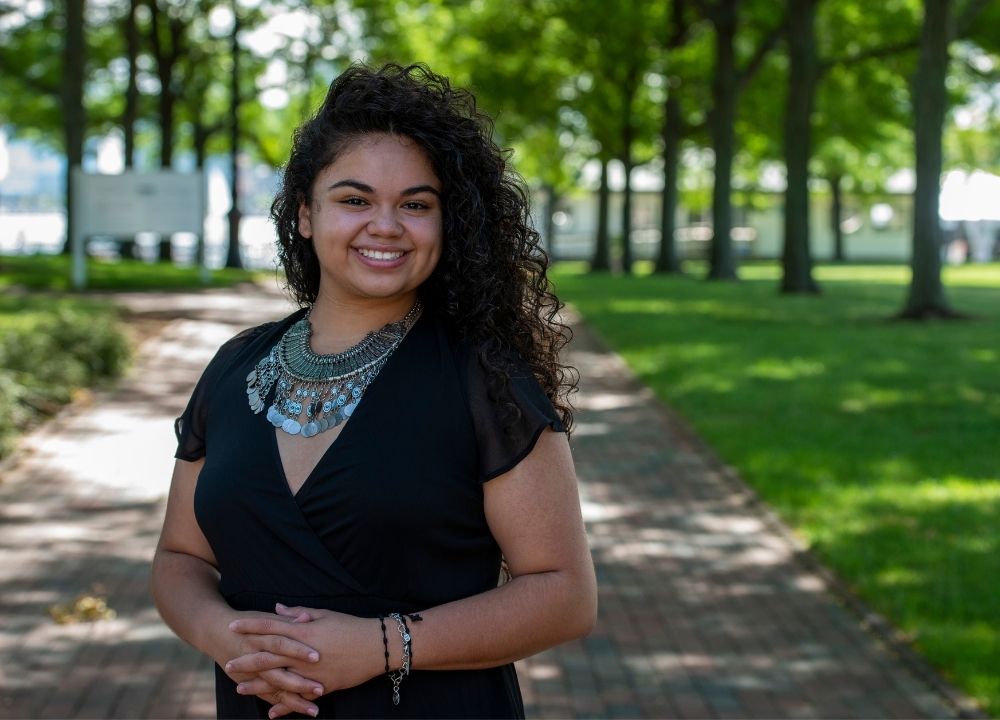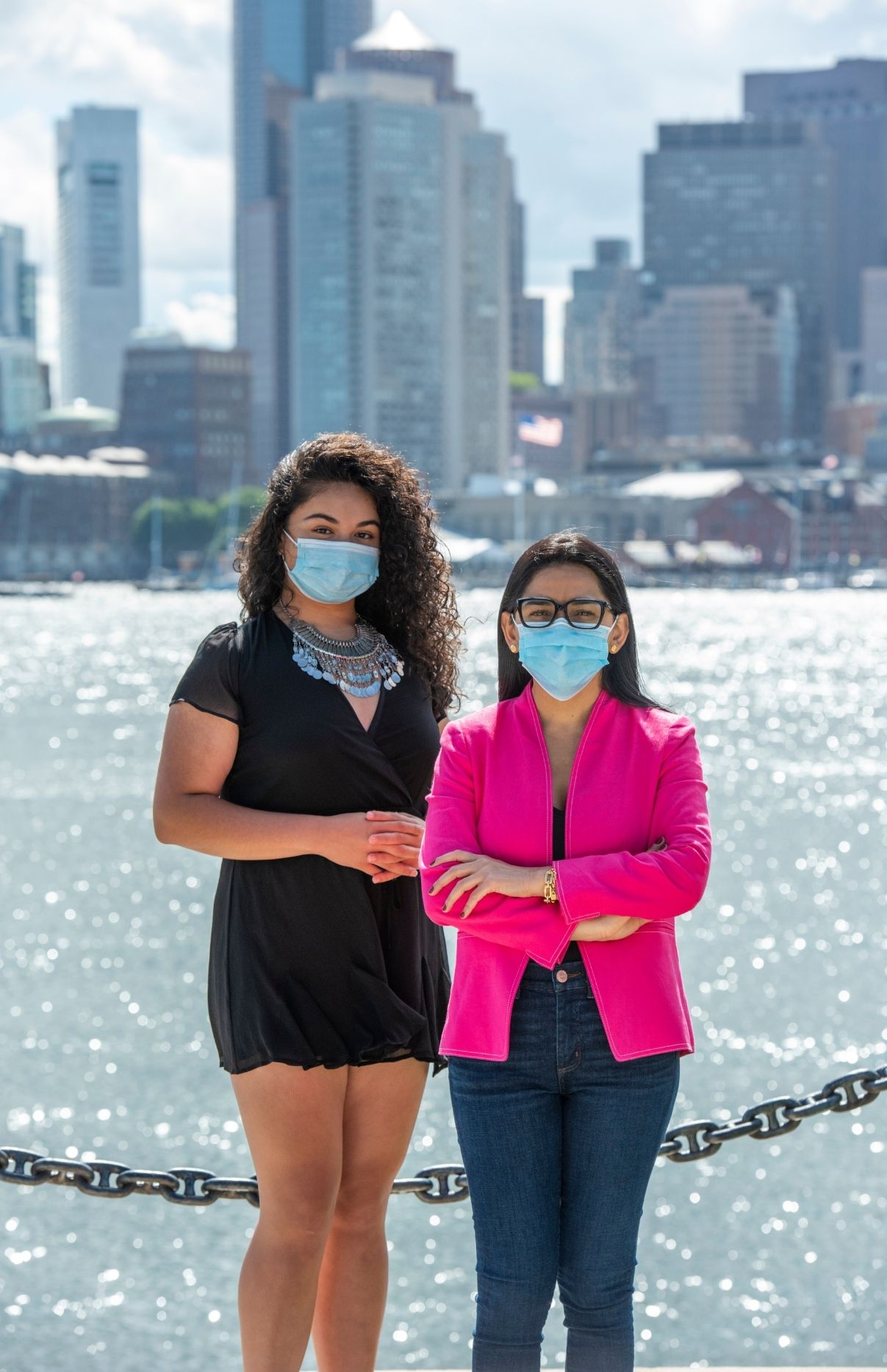Immigration as a Global Issue
Alexa Cuellar
Volunteer and Worker, Centro Presente
Senior, Regis College
Tell us about yourself. Are you from Boston or did you come from somewhere else?
I’m actually from Chelsea, Massachusetts. I’m 21 years of age. My parents are from El Salvador, so I was born here, but I identify as Salvadoran. Spanish was my first language. I am the daughter of two Salvadoran parents who migrated during the war in El Salvador. They came to the United States and met here. I am a first-generation college student. I’m blessed and privileged. I’m studying social work with a minor in Spanish and Latin American Studies.
We were so sorry to hear about your father dying just a couple of weeks ago. Was it COVID?
He didn’t die of COVID, but he did have it two times and it weakened his system. My dad was actually one of the big motivations behind who I am now, why I believe in what I believe in and why I feel passionate about this work. He suffered a lot, which is something that is true of many immigrants from Central America. It was 20 years ago, but he still suffered from the trauma he experienced in El Salvador. He left El Salvador when he was around 18 years old. He was very young. Being an immigrant to the United States is a very difficult and complicated situation. Even just the fear of being undocumented stopped him from feeling that he could seek help. As his daughter, I always felt that I wanted to help him, but I couldn’t really understand the fear he had. That is why I wanted to learn more about the experiences of immigrants.
I always knew I wanted to do humanitarian work—looking at the systems that are in place and how we can change them. How can we connect people to resources that exist now? And how we can advocate for real change?
I’m blessed because I got introduced to Centro Presente and I got to meet Patricia. [Patricia Montes is the executive director of Centro Presente.]
Where did you go to high school?
I went to Northeast Metro Tech. It’s a trade school. It’s in Wakefield. I applied because I thought that by leaving Chelsea, I was going to find more opportunity and be able to go to college. I really wasn’t informed about what a trade school was because I was a first generation student, and my parents really didn’t understand the school system here. Sometimes when you grow up in a place like Chelsea, you believe that there’s no opportunity in your own community—instead of investing in your community. Sometimes people leave the community, so I thought that was the best way for me. And I wasn’t really aware of what a trade school was; I wasn’t that informed. So, that’s why I ended up at Northeast Metro Tech. But, everything happens for a reason, and I think that was a lesson for myself as well.
Where do you go to college?
I’m at Regis College, which is in Weston. It’s very far away, but they offered me a really good scholarship. Obviously, it’s a very different environment for me. And even going to Northeast Metro Tech was a different environment—as a Latina from Chelsea. There were lots of White people. And that’s where I started to think about my identity. I had to question it, because other students were questioning me about it. I remember a student who asked me what part of Mexico I was from. I had a student tell me that my accent was really thick. Sadly, those are typical questions. I expected to hear those questions, but at the same time, I wasn’t prepared for it. Every place is a learning experience.
And, again, that’s why I’m so passionate about the work that I’m doing with Centro and the work that I want to do.
Regis College opened my eyes even more. The people that I connected myself with at Regis, they helped me to find the tools and help me navigate. The things that really shaped me was my parents, their story, how they struggled being immigrant parents here, trying to navigate through their life here.
is a time when a lot of people are rethinking lots of issues because so much is happening. We have the health and financial crisis as well as the racial justice issues that have emerged. But it’s also a time when people are thinking a lot about the future and what will come out of this, the kind of city we want Boston to be.
With everything going on right now, I would love to see people empower the immigrant community. I’m talking about changing systems. I would like to see people from the Central American community given a greater platform because a lot of them pay taxes and it’s a hardworking community, in general. They do a lot for their families and for our community and that isn’t reciprocated. The grassroots organizations are doing so much for the community. Centro Presente, for example, is working directly with the community and with families who are fleeing from day-to-day violence at home. They come here and it’s difficult for them to establish themselves and their kids—and learn to navigate the system here. Once they do, they work so hard and they give so much, but they are still a community that is invisible and marginalized. They’re not given the platform nor the attention they need. This has to change.
Every Latinx community has its struggles and different types of trauma. Obviously they do share the commonality of being an immigrant and what obstacles come with that. But it’s different for each community.
The City of Chelsea wouldn’t be what it is today without immigrants. Since the 1990s, when they came to Chelsea, they have reconstructed it with their small businesses. They did the same for East Boston. But now we’re seeing gentrification there and East Boston has changed drastically too—so many new buildings and other things that are not benefiting the people who live there now, the immigrants who live there now. They gave a lot to the city and now it’s primarily benefiting outsiders. East Boston is not the same community I saw even a few years ago. Now it’s happening in Chelsea.
Tell me what your experiences have been link at Centro Presente. I understand that you have been teaching a class? Tell me about that.
Centro Presente with the City of Boston started a program called The Centro Presente Dreamers Project. It is a youth development program for recently arrived immigrant youth from Central America. It aims to improve the development of critical thinking skills and provide exposure to their lived experiences. So, I provide mentorship and serve as a role model for the youth.
I’m really trying to create a sacred space, even though we have to do it through Zoom. But in this sacred space, we have youth immigrants from different backgrounds, who come together for two or three hours a day to share their immigrant experiences—what their lived experiences have been. And then to also to learn to advocate for themselves. What are their rights here? What should they know? How can they defend themselves? A lot of them will say, “Alexa, I didn’t know I had rights. I wasn’t aware of that.” So, we have 15-16 year-old girls and boys and it’s amazing to see how they interact. Some of them are shy, but then others will motivate them to speak up. But they are all so full of energy. It’s great to see how they motivate themselves and support each other and become leaders. If they have the right resources and they continue doing what they are doing, they will become great leaders.
How did you find out about Centro Presente?
About two years ago, when the U.S. cancelled TPS [Temporary Protective Status] for the Salvadoran community, and Patricia and Centro Presente had a rally in Boston City Hall. I found out about it. My parents were aware of Centro because we have relatives who are undocumented or need some help with something, so I’ve always known about Centro. But when I got to meet Patricia it was when she organized the TPS rally at City Hall. Mayor Marty Walsh came to speak that day as well. I heard her speak and I loved what she was saying. I agreed with what she was saying, her passion, her fire. And I identified a lot myself with her. So, I knew I needed to get to know her. I needed to get involved with the organization a little bit more. So, I connected with her and was able to work with her in the summer. I got involved in the leadership development school that Centro Presente does in the summer. She’s a mentor, not only because of her career, but as a human being. She has such a big heart. I admire who she is as a woman; so powerful, in a good way. When I see Patricia, I see myself in the future—someone I can look up to a lot. I want to thank her for choosing me as an emerging leader and you for thinking of me in this way.
What are some of the other traits that make a good leader, like Patricia?
To be passionate. To be a humanitarian; that’s huge. Empathetic. Someone who has initiative and is very driven. Someone who really listens to people.


